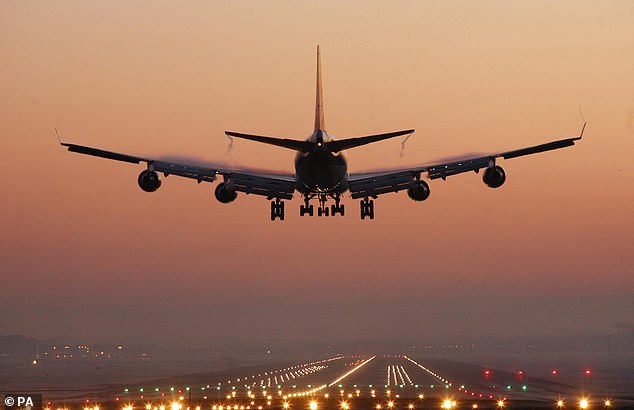Flight plans kept on hold: Getting Britain back in the skies would boost the economy as a whole, says ALEX BRUMMER
Another day and another generous assistance package for hospitality enterprises in higher tier areas.
As important as it is that these firms are kept afloat and jobs for younger workers are conserved, it is hard not to be puzzled about where economic priorities lie.
Northern mayors seem to have been highly effective in pushing the Chancellor Rishi Sunak towards ever more expensive bail-outs.
Airlines rightly are outraged that testing capacity has not been ramped up, with Public Health England claiming it would only pick up 7 per cent of cases for people coming into the UK
But it would be nice to think that the same amount of effort had been put in by Transport Secretary Grant Shapps towards getting Britain back in the skies.
It is incomprehensible that it is only in the last week that a pay-as-you-fly testing system has been established at Heathrow for travellers to Italy and Hong Kong.
The damage done to aviation and business travel in particular is devastating. The third quarter loss for BA owner IAG climbed to £1.3billion much larger than forecasts.
IAG chairman Luis Gallego, who took the controls in September, revealed the group would be working at 30 per cent of capacity in the coming months, against previous 40 per cent guidance.
The chances of IAG becoming cash flow positive in the final quarter have been dashed.
Airlines rightly are outraged that testing capacity has not been ramped up, with Public Health England claiming it would only pick up 7 per cent of cases for people coming into the UK.
Virgin Atlantic boss Shai Weiss says aviation research shows 60 per cent of cases would be identified.
The case for negotiating air corridors and setting up a rigorous testing regime is not just about saving the airlines.
The multiplier effect for the economy if Britain’s service sector could be reinvigorated would be enormous.
It is astonishing that at the very moment new financial legislation is being introduced to make it simpler for the City to go global after Brexit, the super-sales people who head the London-based investment banks and insurers cannot get on the ground to negotiate deals.
Existing clients can be served from home offices and bedrooms, but nailing down new business requires the personal touch.
IAG and its previously most profitable offshoot BA should emerge from this crisis in better shape than European competitors.
It has taken the axe to labour costs, retired fuel-hungry 747s and even displaced its chief executive Alex Cruz, widely criticised for failing both customers and workforce. It also has stocked up on capital.
When and if pandemic restrictions ease, skies re-open and traffic picks up it should be leaner and meaner.
That could give it an edge over Continental rivals which by accepting state bailouts are less able to cut costs.
Cleaner living
The fresh way of looking at Unilever is home and away. Across the piece, sales of hygiene products and food eaten at home are booming. Food service and health sales to the hospitality industry are tougher.
The only major market firing on all cylinders is China, where Covid-19 has been banished to the boondocks, the economy is bouncing and demand for Unilever’s rich choice of brands doing nicely.
Unilever disinfectant brands, such as Lifebuoy, are having a resurgence which parallels Dettol at Reckitt Benckiser.
Hopefully, when the world does emerge from Covid, it will be a cleaner place. Nevertheless, with so much uncertainty in key emerging markets, including India, Indonesia and Latin America, chief executive Alan Jope is being very cautious about prospects.
The corporate hygiene on Unilever’s agenda, unifying the company’s Anglo-Dutch structure in the UK, is on track with both groups of shareholders unanimously approving the plan.
The remaining obstacle is the movement in the Dutch parliament for an exit tax – which could scupper the proposal.
But a Dutch government, which supports an open economy, is unlikely to shoot itself in the foot.
Wrong ticket
By the standards of big tech the £3billion purchase of StubHub by controversial ticket marketplace Viagogo might normally not cause a ripple.
This is especially true in a pandemic when so many sports arenas are operating behind closed doors and the live music industry moribund.
Nevertheless, the ruling by Britain’s Competition & Markets Authority that the deal creates a 90 per cent monopoly likely will require some severe remedies including spin-offs.
At a moment when competition authorities in the US and Europe are pushing back against digital dominance the CMA is sending a powerful signal.

